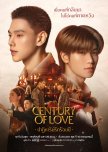Delightfully overdramatic
A disclaimer first: I watched this drama while I was sick, and in pain from an ear infection -- what I wanted was something sufficiently fast-paced and engaging but not too complex in terms of plot. It was clear from the first episode that "Century of Love" would be exactly what I needed.
It's a delightfully overdramatic series -- from San's over-the-top reaction to Vad's death in the past, to the supernatural elements, the heinous villains, and San's family in the present. It was fun to watch, appropriately ridiculous in the fight choreographies (and their sound effects) and the main villain in his wheelchair, which was juxtaposed with the silliness of San's family members trying to get them together.
Some plot-changing decisions didn't make any sense to me -- why did the shrine keeper/priest in 1924 agree to the ritual, if it would result in the destruction of the last piece of Nüwa's Five-Coloured Stone? Why did he not refuse, since death and loss are part of the cycle of life? Why didn't Tao (the shrine keeper/priest in 2024) recognise the signs of Nüwa's approval and why didn't he trust in his own calculations but let himself be confused by lies later on?
Nevertheless, the drama is remarkably consistent in keeping to its universe's rules, in the actions of the main and supporting characters and in the story they want to tell.
Because the story is not without depth. The core message the writer wanted San / us to see is being spelled out towards the end of the last episode, so I won't spoil that for anyone who hasn't seen the drama yet.
Another aspect I found much more interesting is the way two forms of homophobia are shown here -- the overt homophobia of San and the internalised homophobia of Vee (which is reinforced by his low self-esteem, more on that later). San's homophobic behaviour comes from the time he grew up in, he believes in the values and customs he's known all his life, and after he has overcome them, he is very much willing to pursue a relationship with Vee. We've seen that in other BLs already, even if not that often in the last year or so.
Vee, on the other hand, is even more interesting. Outwardly, he's openly bisexual, he is out to his grandma, he has had sexual relationships before, and he admits early on that he has a crush on that handsome man named San. However, the deeper his feelings for San grow, the more insecure he becomes. He doesn't trust this budding relationship, and with good reason -- don't we all know that "you should never fall for a straight man"? It gets worse when a young woman, who calls herself Vadfah and tells them that she has dreamed of San all her life (unlike Vee), and has the same birth date and place as Vee, so they share the same destiny -- as Tao says, the probability that she is the real Vad, is higher for her than for Vee. The probability is also higher just because she is a woman -- isn't it more "normal", more "usual", and doesn't it make more sense that she is the one San has been waiting for? Vee believes all these things.
Vee also has quite low self-esteem. He manages to hide it by playing up his goofy side, by smiling and laughing, by making self-deprecating jokes -- but occasionally he will let another character (and us) in, and tell us about growing up poor, about how he was cheated because of it and now has a criminal record, how having his grandmother as his only family member made him an outcast among his peers; and then he will try to laugh it off, play down his experiences, while the others look on in horror. With San, he is a bit more direct; he tells San that he's not worthy enough to be with him because he's from another class, because he's a man, because he is Vee.
I love Vee's complexity, his optimistic side, and his love for his family, as well as his insecurities and self-doubt. He is a well-written and consistent character, and I wish they'd have explored him a lot more.
However, I do understand that this is not the main story the writers wanted to tell -- it's a side story, and just the story that I, as a viewer would have found more interesting. So, this doesn't affect my rating.
These three aspects -- San's overt homophobia in the beginning, Vee's internalised homophobia and his low self-esteem -- all of them could have given the series a deeper meaning if the writers had made them stand out a bit more, made the character's emotional journey clearer, or maybe given them a bit more room.
On the other hand, I do understand that this drama was always supposed to focus on the romance, the villains' plot and the message they spelled out at the end (although I would have liked to see that shown more clearly throughout the drama, rather than being said outright -- but then, I'm a fan of subtle storytelling).
One other thing I'd like to point out is that I love the colours and the sets -- I love how the living spaces reflect the characters, and even Vee's room in the first episodes, which we only see in a few scenes, does this. I love the shrine, with its rich reds and its shadows. I love how San's mansion stands out ridiculously among the low and small houses around it.
Was it good?
For a Thai BL, it definitely was. It had a theme that was different from the usual plots, it was consistent, even if a bit overdramatic and more or less predictable.
Did I like it?
I did! I do wonder though, if I had liked it as much if I hadn't been sick.
Would I recommend it?
I would, with the caveat that it feels very Thai, and not to expect a masterpiece of art.
It's a delightfully overdramatic series -- from San's over-the-top reaction to Vad's death in the past, to the supernatural elements, the heinous villains, and San's family in the present. It was fun to watch, appropriately ridiculous in the fight choreographies (and their sound effects) and the main villain in his wheelchair, which was juxtaposed with the silliness of San's family members trying to get them together.
Some plot-changing decisions didn't make any sense to me -- why did the shrine keeper/priest in 1924 agree to the ritual, if it would result in the destruction of the last piece of Nüwa's Five-Coloured Stone? Why did he not refuse, since death and loss are part of the cycle of life? Why didn't Tao (the shrine keeper/priest in 2024) recognise the signs of Nüwa's approval and why didn't he trust in his own calculations but let himself be confused by lies later on?
Nevertheless, the drama is remarkably consistent in keeping to its universe's rules, in the actions of the main and supporting characters and in the story they want to tell.
Because the story is not without depth. The core message the writer wanted San / us to see is being spelled out towards the end of the last episode, so I won't spoil that for anyone who hasn't seen the drama yet.
Another aspect I found much more interesting is the way two forms of homophobia are shown here -- the overt homophobia of San and the internalised homophobia of Vee (which is reinforced by his low self-esteem, more on that later). San's homophobic behaviour comes from the time he grew up in, he believes in the values and customs he's known all his life, and after he has overcome them, he is very much willing to pursue a relationship with Vee. We've seen that in other BLs already, even if not that often in the last year or so.
Vee, on the other hand, is even more interesting. Outwardly, he's openly bisexual, he is out to his grandma, he has had sexual relationships before, and he admits early on that he has a crush on that handsome man named San. However, the deeper his feelings for San grow, the more insecure he becomes. He doesn't trust this budding relationship, and with good reason -- don't we all know that "you should never fall for a straight man"? It gets worse when a young woman, who calls herself Vadfah and tells them that she has dreamed of San all her life (unlike Vee), and has the same birth date and place as Vee, so they share the same destiny -- as Tao says, the probability that she is the real Vad, is higher for her than for Vee. The probability is also higher just because she is a woman -- isn't it more "normal", more "usual", and doesn't it make more sense that she is the one San has been waiting for? Vee believes all these things.
Vee also has quite low self-esteem. He manages to hide it by playing up his goofy side, by smiling and laughing, by making self-deprecating jokes -- but occasionally he will let another character (and us) in, and tell us about growing up poor, about how he was cheated because of it and now has a criminal record, how having his grandmother as his only family member made him an outcast among his peers; and then he will try to laugh it off, play down his experiences, while the others look on in horror. With San, he is a bit more direct; he tells San that he's not worthy enough to be with him because he's from another class, because he's a man, because he is Vee.
I love Vee's complexity, his optimistic side, and his love for his family, as well as his insecurities and self-doubt. He is a well-written and consistent character, and I wish they'd have explored him a lot more.
However, I do understand that this is not the main story the writers wanted to tell -- it's a side story, and just the story that I, as a viewer would have found more interesting. So, this doesn't affect my rating.
These three aspects -- San's overt homophobia in the beginning, Vee's internalised homophobia and his low self-esteem -- all of them could have given the series a deeper meaning if the writers had made them stand out a bit more, made the character's emotional journey clearer, or maybe given them a bit more room.
On the other hand, I do understand that this drama was always supposed to focus on the romance, the villains' plot and the message they spelled out at the end (although I would have liked to see that shown more clearly throughout the drama, rather than being said outright -- but then, I'm a fan of subtle storytelling).
One other thing I'd like to point out is that I love the colours and the sets -- I love how the living spaces reflect the characters, and even Vee's room in the first episodes, which we only see in a few scenes, does this. I love the shrine, with its rich reds and its shadows. I love how San's mansion stands out ridiculously among the low and small houses around it.
Was it good?
For a Thai BL, it definitely was. It had a theme that was different from the usual plots, it was consistent, even if a bit overdramatic and more or less predictable.
Did I like it?
I did! I do wonder though, if I had liked it as much if I hadn't been sick.
Would I recommend it?
I would, with the caveat that it feels very Thai, and not to expect a masterpiece of art.
Was this review helpful to you?


 2
2 11
11 1
1 2
2 1
1






















